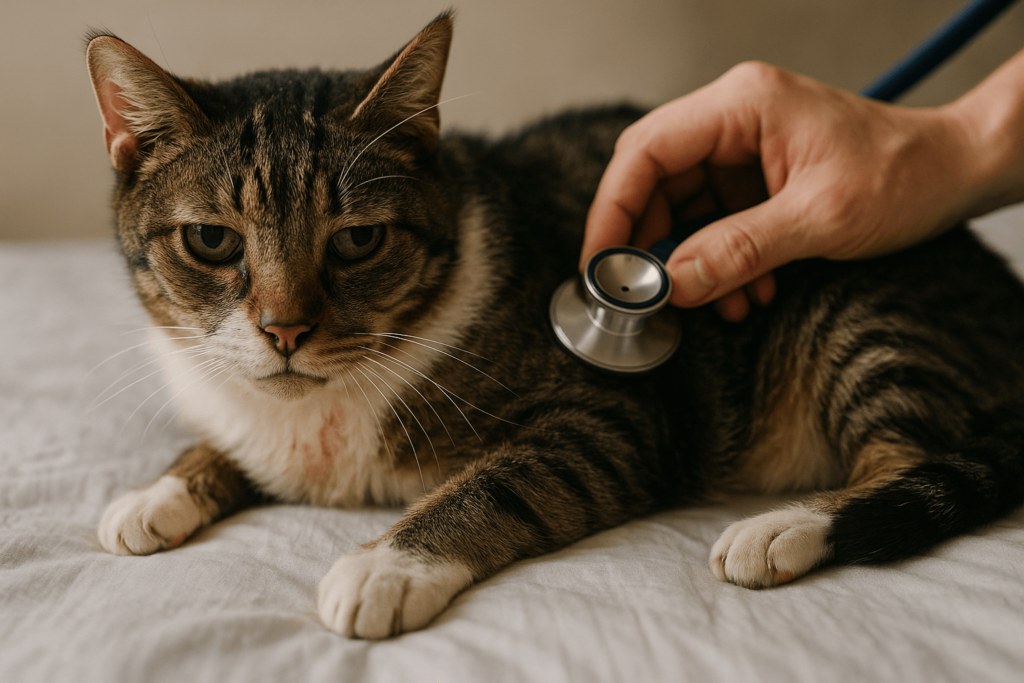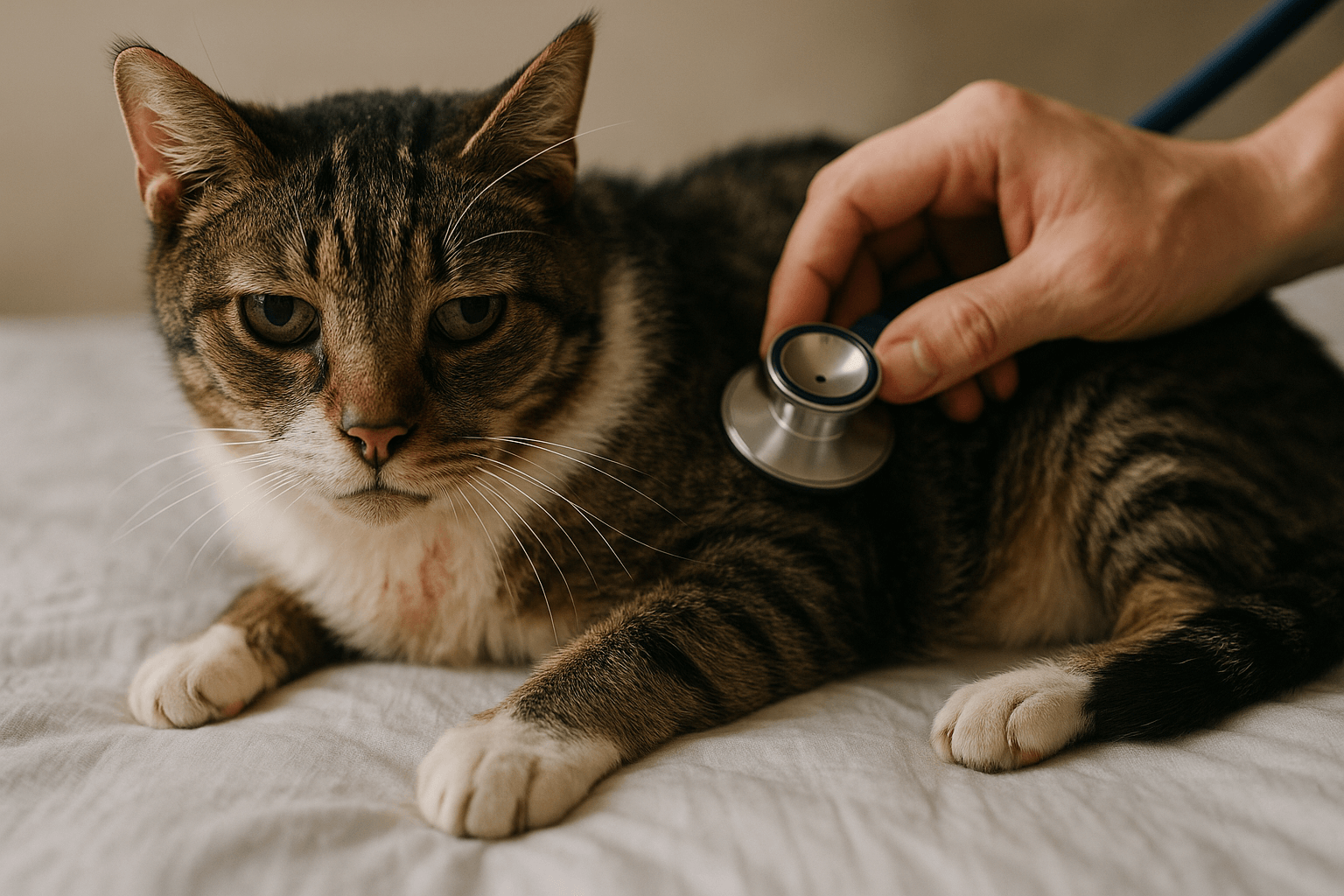Acute Kidney Failure in Cats: A Complete Guide to Symptoms, Causes & Care
Acute kidney failure in cats is a sudden and life-threatening condition that demands immediate attention. Unlike chronic kidney disease, which develops slowly over time, acute kidney failure can strike rapidly — within hours or days — and severely impairs the kidneys’ ability to filter waste from the blood. This sudden decline affects hydration, electrolyte balance, and overall organ function. Recognizing early signs such as decreased urination, lethargy, vomiting, or loss of appetite is crucial. With prompt veterinary intervention, many cats can recover fully. Understanding the causes, symptoms, and treatment options empowers you to act fast and protect your feline companion’s health when every moment counts.
What Happens During Acute Kidney Failure in Cats?
When a cat experiences acute kidney failure, their kidneys abruptly lose the ability to perform essential functions like removing toxins, balancing fluids, and regulating electrolytes. This sudden shutdown disrupts the body’s internal stability and can lead to systemic complications if not addressed immediately.
Toxin Buildup: The kidneys normally filter out metabolic waste like urea and creatinine. In acute failure, these toxins accumulate rapidly in the bloodstream, leading to poisoning effects throughout the body.
Fluid Imbalance: Without proper filtration, fluid levels become erratic — some cats develop dehydration, while others may retain dangerous amounts of fluid in tissues or organs.
Electrolyte Disruption: Critical minerals like potassium, sodium, and calcium go out of balance, potentially causing heart arrhythmias, muscle weakness, or neurological issues.
Decreased Urine Output: One of the hallmark signs is oliguria (low urine production) or anuria (no urine), indicating the kidneys are no longer effectively processing fluids.
Metabolic Acidosis: The body becomes too acidic due to the inability to excrete hydrogen ions, impairing cellular function and worsening overall condition.
These physiological changes occur quickly and can escalate into multi-organ failure. Early detection and aggressive treatment are vital to reverse damage and support recovery.

Common Causes of Acute Kidney Failure in Cats
Several factors can trigger acute kidney injury, often related to exposure, illness, or underlying conditions. Identifying potential causes helps prevent this serious issue before it arises.
Toxic Exposure: Common household poisons like lilies, antifreeze (ethylene glycol), certain medications (NSAIDs, some antibiotics), and even human foods can cause rapid kidney damage.
Dehydration: Severe fluid loss from prolonged vomiting, diarrhea, heat exposure, or insufficient water intake reduces blood flow to the kidneys, impairing their function.
Urinary Blockage: Although more commonly linked to lower urinary tract disease, complete obstruction can back up pressure into the kidneys and cause acute injury.
Infections: Bacterial infections such as pyelonephritis (kidney infection) or systemic illnesses like leptospirosis can directly damage kidney tissue.
Low Blood Pressure: Events like severe bleeding, anesthesia complications, or shock reduce perfusion to the kidneys, leading to ischemic injury.
Understanding these triggers allows cat owners to minimize risks through safe environments, proper medication use, and vigilant monitoring of health changes.
Check this guide 👉Cat Kidney Stone Treatment: Best 7 Expert Tips!
Check this guide 👉Cat Kidney Stone Symptoms: Best 7 Expert Tips!
Check this guide 👉Choosing the Right Cat Food for Kidney Disease: Best 7 Tips!
| Key Warning Signs | Why It Matters |
|---|---|
| Sudden decrease or absence of urination | Indicates kidneys are failing to filter and produce urine. |
| Vomiting and nausea | Caused by toxin buildup affecting the digestive system. |
| Lethargy or depression | Reflects systemic illness and reduced energy metabolism. |
| Loss of appetite or refusal to eat | Often one of the earliest observable behavioral changes. |
| Bad breath with ammonia-like odor | Sign of uremia — toxic waste accumulating in the blood. |
Early Symptoms That Should Never Be Ignored
Cats are masters at hiding pain and illness, but subtle changes in behavior or routine can signal the onset of acute kidney failure. Recognizing these early indicators can mean the difference between recovery and irreversible damage.
Increased Thirst Followed by Sudden Drop: Initially, your cat may drink excessively as the body tries to flush toxins, but as kidney function plummets, they may stop drinking altogether.
Changes in Litter Box Habits: Reduced urine volume, straining to urinate, or bloody urine are urgent red flags requiring immediate vet evaluation.
Hiding or Withdrawal: A normally social cat retreating to quiet places may be feeling unwell and seeking safety.
Poor Grooming: Dull, matted fur suggests your cat lacks the energy or motivation to self-clean, often due to nausea or discomfort.
Weakness or Wobbliness: Neurological symptoms like stumbling or head tilt can result from electrolyte imbalances or toxin accumulation.
If you notice any combination of these signs — especially after potential toxin exposure — contact your veterinarian immediately. Time is critical in managing acute kidney failure.
How Veterinarians Diagnose Acute Kidney Failure
Diagnosis requires a thorough clinical assessment, including physical examination, medical history, and diagnostic testing to confirm kidney dysfunction and identify the underlying cause.
Blood Tests: Elevated levels of BUN (blood urea nitrogen) and creatinine indicate impaired kidney filtration and are central to diagnosis.
Urinalysis: Evaluates urine concentration and presence of protein, blood, or sediment, helping determine if the kidneys are responding appropriately.
Imaging: Ultrasound or X-rays allow vets to examine kidney size, shape, and structure, detecting obstructions, stones, or signs of trauma.
Complete Blood Count (CBC): Checks for infection, anemia, or inflammation that could contribute to or result from kidney injury.
Additional Testing: Depending on suspected cause, tests for infectious diseases, toxin levels (e.g., ethylene glycol), or blood pressure may be performed.
Accurate diagnosis guides treatment decisions and improves prognosis. Early imaging and lab work are essential tools in pinpointing the root issue.
Treatment Options for Cats with Acute Kidney Failure
Treatment must begin swiftly and is typically intensive, often requiring hospitalization. The goal is to stabilize the cat, address the underlying cause, and support kidney recovery.
Intravenous Fluid Therapy: The cornerstone of treatment, IV fluids help flush toxins, restore hydration, and improve blood flow to the kidneys.
Medication Management: Drugs may be used to control vomiting, manage blood pressure, correct electrolyte imbalances, or treat infections.
Dialysis (in Severe Cases): While rare and only available at specialty centers, hemodialysis can temporarily take over kidney function in critical cases.
Nutritional Support: Appetite stimulants or feeding tubes may be needed if the cat refuses food, ensuring they receive essential nutrients during recovery.
Monitoring and Adjustments: Continuous monitoring of urine output, blood values, and vital signs allows for real-time adjustments in care.
Recovery depends heavily on how quickly treatment starts and whether the underlying cause is reversible. Some cats regain full function; others may transition to chronic management.
Preventing Acute Kidney Failure in Your Cat
While not all cases are preventable, many risk factors can be managed through proactive care and environmental awareness.
Keep Toxins Out of Reach: Store medications, cleaning products, and toxic plants (especially lilies) securely away from curious paws.
Provide Fresh Water Always: Encourage hydration with multiple water sources, fountains, or adding wet food to their diet.
Avoid Over-the-Counter Medications: Never give human drugs like ibuprofen or aspirin without veterinary guidance — even small doses can be fatal.
Schedule Regular Vet Checkups: Routine bloodwork can detect early signs of kidney stress before full failure occurs.
Monitor for Illness Promptly: Address vomiting, diarrhea, or urinary issues quickly before they lead to secondary kidney complications.
Prevention is always better than cure — especially when dealing with a condition as serious as acute kidney failure.
Supporting Your Cat During Recovery at Home
After hospital discharge, home care plays a crucial role in healing and preventing relapse. Your cat will need ongoing support, patience, and close observation.
Follow Veterinary Instructions Precisely: Administer medications, special diets, and follow-up appointments exactly as directed.
Offer Highly Palatable Food: Choose kidney-friendly wet food to encourage eating and maintain hydration during recovery.
Create a Calm Environment: Minimize stress with quiet spaces, consistent routines, and gentle interaction.
Track Urination and Drinking: Keep a daily log to ensure your cat is producing adequate urine and staying hydrated.
Watch for Relapse Signs: Any return of vomiting, lethargy, or appetite loss should prompt an immediate vet visit.
Home care bridges the gap between emergency treatment and long-term wellness. Your vigilance ensures the best chance for a full recovery.
Frequently Asked Questions About Acute Kidney Failure in Cats
Can cats survive acute kidney failure?
Yes, many cats can survive if treatment begins early and the underlying cause is treatable. Survival rates improve significantly with prompt veterinary care.
How long does it take for a cat to recover from acute kidney failure?
Recovery time varies — some cats improve within days, while others may take weeks. Ongoing monitoring is essential even after symptoms resolve.
Is acute kidney failure the same as chronic kidney disease?
No. Acute kidney failure comes on suddenly and may be reversible. Chronic kidney disease progresses slowly and is irreversible but manageable.
What foods should I feed my cat after kidney failure?
Your vet will likely recommend a prescription renal diet low in phosphorus and protein, designed to reduce strain on the kidneys.
Can dehydration cause acute kidney failure?
Yes, severe dehydration reduces blood flow to the kidneys and can trigger acute injury, especially in older or ill cats.
Helping Your Cat Thrive After Kidney Crisis
Acute kidney failure is a frightening experience, but with fast action and dedicated care, many cats make a full recovery. The key lies in early recognition, immediate treatment, and ongoing prevention. By understanding the risks and symptoms, you become your cat’s first line of defense. Stay alert, stay informed, and never underestimate the power of timely veterinary care. A healthy, happy life awaits on the other side of crisis — and your love and vigilance can get them there.
Canned Pumpkin for Cat Diarrhea: Best 7 Expert Tips! Natural remedy to firm stools, soothe upset bellies, and support gut health safely.
Can a Cat Give You Scabies? Best 7 Expert Tips! Discover the truth about feline mites, human skin risks, and how to protect yourself—without panic.
Cat Flea vs Human Flea: Best 7 Expert Tips! Discover the truth about bites, species, and how to eliminate infestations for good.
Weird Cat Behaviors: Best 7 Expert Tips! Discover why cats do strange things—and how to understand, not punish, their instincts for a happier home.





